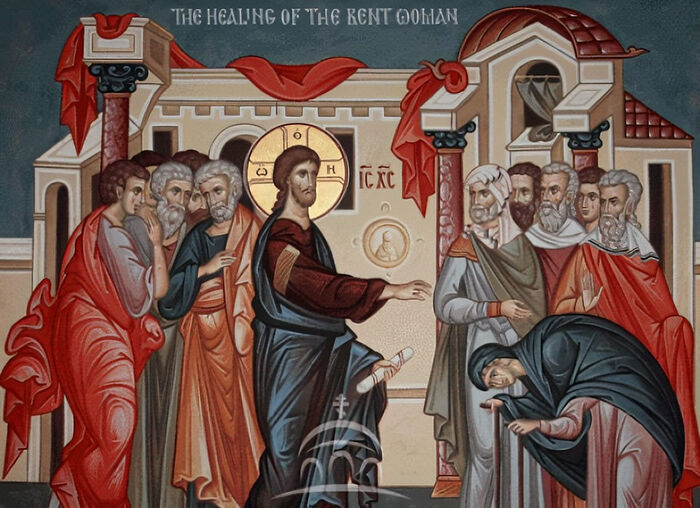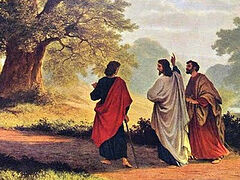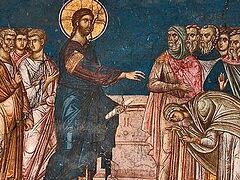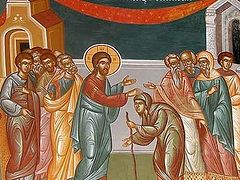When Jesus Christ was teaching in a synagogue on the Sabbath, he saw a woman who was bent over and could not straighten up. She had been that way for eighteen years. Imagine how her life had changed due to her disability, how frustrating that chronic illness had to be, especially in a time before modern medicine and physical therapy. The Lord said to her, “Woman, you are loosed from your infirmity.” When He laid hands on her, she was healed. When the woman stood up straight again, she glorified God.
As was often the case when the Savior healed on the Sabbath day, there were those standing around just waiting to criticize Him for working on the day of rest. He responded to them by noting that people do what is necessary to take care of their animals on the Sabbath. “So ought not this woman, being a daughter of Abraham, whom Satan has bound for eighteen years, be loosed from this bond on the Sabbath?” The force of His point was so clear that those self-righteous hypocrites were put to shame and the people rejoiced.
In these weeks of the Nativity Fast, we pray, fast, give to the needy, and confess and turn away from our sins as we prepare to celebrate the wonderful news of the Incarnation of the Son of God, of our Lord’s birth at Christmas for the salvation of the world. Today’s gospel text provides a beautiful image of what Jesus Christ has done for us by becoming a human being by uniting divinity and humanity in His own Person. These weeks of preparation give us all the opportunity to gain the spiritual clarity to see ourselves in that poor woman bent over and bound with chronic, debilitating infirmity.
Though we often do our best to hide it, we are all too well acquainted with illness, pain, and death. We face chronic challenges of various kinds from which we cannot deliver ourselves or our loved ones. We have diseases of soul, of personality, of behavior, and of relationships that cripple us, that keep us from acting, thinking, and speaking with the joyful freedom of the children of God. We are all bent over and crippled in profound ways in relation to the Lord, our neighbors, and even ourselves. We have all fallen short of fulfilling God’s gracious purposes for us, as has every generation since Adam and Eve.
Joachim and Anna knew all about long-term frustration and pain, for like Abraham and Sarah they were childless into their old age. God heard their prayers, however, and gave them Mary, who would in turn give birth to the Savior Who came to liberate us all from sin and death. We celebrate in the coming week the feast of St. Anna’s conception of the Theotokos, which foreshadows the coming of the Lord to loose us from the infirmities that hinder our participation even now in the joyful life of the Kingdom.
The story of the Old Testament unfolded through the family of Abraham, who was told by God that he would be the father of a large, blessed family. Some think of life after death as being accomplished through ongoing generations of children and grandchildren, not by victory over death itself. If God’s blessings extended no further than the grave, however, then no one would ever be loosed from bondage to the wages of sin, which is death itself. Only a Savior Who is truly divine and human could enter fully into the fatal consequences of our corruption and then rise victorious over them, making it possible for us to participate in the eternal life of the heavenly kingdom.
The history of the Hebrews was preparatory for the coming of the Christ, the Messiah in Whom God’s promises are fulfilled and extended to all who have faith in the Savior, regardless of their ethnic or national heritage. Christ did not come to promote one nation over another or to set up an earthly kingdom of any kind, but to fulfill our original calling as those created in the image and likeness of God. He unites divinity and humanity in Himself and makes it possible for us to share in the eternal life of the Holy Trinity as distinct, unique persons who become radiant with the divine glory by grace. God breaks the laws of nature, at least as we know them in our world of corruption, in order to save us, enabling elderly women like Sarah and Anna to conceive and bear children and a young virgin named Mary to become the mother of His Son, Who Himself rose from the dead after three days in the tomb. He is born at Christmas to work our liberation, to break the bonds of death, and to heal the brokenness of our life in this world of corruption.
The Lord did not treat the woman in today’s reading according to her physical condition as simply an impersonal bundle of disease, even as St. Anna’s fate was not defined by barrenness. Instead, He revealed her true identity as a beloved person, a daughter of Abraham, by enabling her to stand up straight for the first time in years. On that particular Sabbath day, Jesus Christ treated her as a unique, cherished child of God who was not created for slavery to a wretched existence of pain, disease, and despair, but for blessing, health, and joy. She glorified God for this deliverance from bondage, for this restoration of freedom, as did those who saw the miracle.
The good news of Christmas is that the Savior is born to do the same for us all, to set us free from captivity to the decay, corruption, and weakness that have taken root in our souls. He comes to deliver us from being defined by our infirmities so that we can leave behind our bondage and enter into the joyous freedom of the children of God. He comes to restore us as living icons who manifest His glory and salvation as the unique persons He created us to be.
Our salvation is a process of becoming more fully our true ourselves by embracing Christ’s healing of the human person. There is no limit to the unique beauty of our souls other than those we impose by our own refusal to unite ourselves to Him in holiness. The more we share by grace in the life of the Holy Trinity, the more we will see that the process of our fulfillment in God is eternal. Since our fundamental calling is to become like God in holiness, we become more truly ourselves whenever we turn away from slavery to sin and corruption in order to embrace more fully the new life that Christ has brought to the world.
Most people today probably do not think of Advent and Christmas in relation to liberation from our bondage to sin and death. More typically, we distort them into opportunities to strengthen our addiction to the love of money and possessions and to excess in food and drink. Such self-centered indulgence is really nothing but bondage to ourselves, which can easily leave us so weak spiritually that we will never be able to straighten ourselves up. That is not surprising because, as God’s children, we were not created to find our fulfillment in the passing things of creation or in satisfying self-centered desires for bodily pleasure. That is why we must resist the cultural temptation to become so busy with shopping, planning, and partying this time of year that we end up ignoring the profound spiritual gravity of our Lord’s Incarnation. He is born to restore us to the full dignity of His sons and daughters, to make us personal participants in the blessing and joy of the heavenly kingdom. He comes to loose us all from slavery to sin and death.
In the remaining weeks of the Nativity Fast, let us follow St. Paul’s advice to acquire “the fruit of the Spirit…love, joy, peace, longsuffering, kindness, goodness, faith, meekness, [and] self-control.” Let us use this season to crucify “the flesh with the passions and the lusts” as we are loosed from the debilitating corruptions of sin by the mercy of the God-Man born for our salvation. As we pray, fast, give to the needy, and confess and repent of our sins this Advent, let us do so with the joyful hope of the woman who could finally stand up straight after eighteen years. For the Savior is born to deliver us from bondage in all its forms. It is time to rise up with Him into the blessed life of holiness He comes to share with us, for we have already had more than enough of pain and infirmity. As daughters and sons of Abraham by faith, let us embrace the healing that is ours in Jesus Christ.




